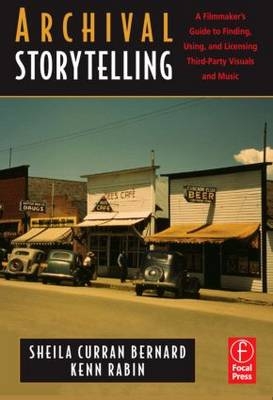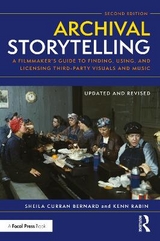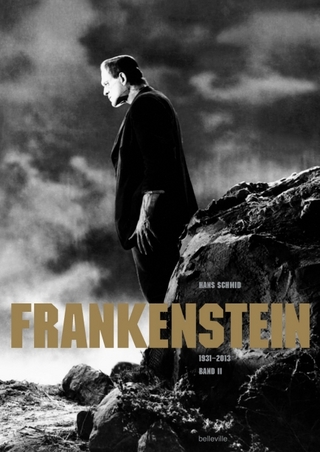
Archival Storytelling: A Filmmaker's Guide to Finding, Using, and Licensing Third-Party Visuals and Music
Focal Press (Verlag)
978-0-240-80973-1 (ISBN)
- Titel erscheint in neuer Auflage
- Artikel merken
Archival Storytelling is an essential, pragmatic guide to one of the most challenging issues facing filmmakers today: the use of images and music that belong to someone else. Where do producers go for affordable stills and footage? How do filmmakers evaluate the historical value of archival materials? What do verite' producers need to know when documenting a world filled with rights-protected images and sounds? How do filmmakers protect their own creative efforts from infringement?
Filled with advice and insight from filmmakers, archivists, film researchers, music supervisors, intellectual property experts, insurance executives and others, Archival Storytelling defines key terms-copyright, fair use, public domain, orphan works and more-and challenges filmmakers to become not only archival users but also archival and copyright activists, ensuring their ongoing ability as creators to draw on the cultural materials that surround them.
Features conversations with industry leaders including Patricia Aufderheide, Hubert Best, Peter Jaszi, Jan Krawitz, Lawrence Lessig, Stanley Nelson, Rick Prelinger, Geoffrey C. Ward and many others.
Additional praise for Archival Storytelling:
"I've been making historical documentaries for many years, yet I learned new things from this book. This is the definitive guide for archival research for documentary filmmakers. An invaluable resource." -Mark Jonathan Harris, Distinguished Professor, School of Cinematic Arts, University of Southern California, and writer/director, The Long Way Home and Into the Arms of Strangers
"One of the best-and most needed-[books] I have seen in a while..The challenge is to keep what is a fairly technical aspect of filmmaking interesting without compromising the quality and depth of information. The authors have done an exceptional job in this regard by the careful interweaving of interviews with researchers, filmmakers and legal experts through the factual material.There is the strong sense of being in the presence of experienced filmmakers and researchers who accept that while there are standard practices, archival use and intellectual property laws etc. are contingent fields in which each case must be assessed and dealt with on its merits." -Bruce Sheridan, Chair, Film & Video Department, Columbia College
"It's hard to imagine a more organized, comprehensive dissection of Byzantine material. The authors have produced a tremendous guide for all who use archival resources. Best of all, because of their effort, I believe more individuals will be able to access and properly utilize such material. This book will serve filmmakers and, in turn, the public for years to come." -Thomas Speicher, Producer, Pennsylvania College of Technology
"Not simply a 'how-to' manual, it is also a discussion of ideas, issues and history that creates an enjoyable text even when the subject matter becomes complicated.The real world examples, the roundtable discussions, and the exploration of ideas and issues surrounding the technical aspects are very welcome and well done." -Dustin Ogdin, Filmmaker, Spoke Digital Films
"The book properly advances the notion that 'films matter,' but this is countered by discussants with 'films cost money too.' Filmmakers may take decades to recoup, and licensing helps. It's an ongoing volley, the chapter engenders a road map through the split, the tension makes a good read...This authorative book belongs on every producer's shelf." -Loren S. Miller, Freelance Documentary and Dramatic Editor, Emerson College
Sheila Curran Bernard is an Emmy and Peabody Award-winning filmmaker and the author of Documentary Storytelling, a best selling guide to story and structure in nonfiction filmmaking, and , a guide to using archival footage and material in films. Her archival film credits include the series Eyes on the Prize, I'll Make Me a World, This Far By Faith, America's War on Poverty, and School, for which she also co-wrote the companion book. She has taught at Princeton University and Westbrook College and recently joined the faculty of the University at Albany, State University of New York. Kenn Rabin is an internationally recognized expert on the use of archival materials in film storytelling. His credits include the dramatic features Milk, directed by Gus Van Sant; Good Night, and Good Luck, directed by George Clooney; and The Good German, directed by Steven Soderbergh, in addition to a number of acclaimed archival television series, including the 13-hour Vietnam: A Television History and the 14-hour Eyes on the Prize, for which he was nominated for an Emmy.
1 Introduction
PART I: FINDING IT
2 What are archival materials?
3 Finding what you need
4 Should you hire a professional?
5 A global perspective: Conversations with researchers in Moscow, Sydney, Toronto, and Washington
PART II: USING IT
6 Practical considerations
7 Ordering what you need
8 Creative considerations
9 An ongoing process: A conversation with Geoffrey C. Ward
10 Ethical considerations: A roundtable
PART III: LICENSING IT
11 Introduction to rights and licenses
12 The public domain
13 Getting things right: A conversation with Lawrence Lessig
14 Fair use
15 Fair dealing, moral rights, and more: A conversation with Hubert Best
16 Licensing visuals
17 Licensing music
18 Legal considerations: A roundtable
19 Afterword
PART IV: ADDITIONAL MATERIAL
Sources and Notes
Books and Films
About the authors
Index
| Verlagsort | Oxford |
|---|---|
| Sprache | englisch |
| Maße | 152 x 229 mm |
| Gewicht | 476 g |
| Themenwelt | Kunst / Musik / Theater ► Film / TV |
| ISBN-10 | 0-240-80973-4 / 0240809734 |
| ISBN-13 | 978-0-240-80973-1 / 9780240809731 |
| Zustand | Neuware |
| Informationen gemäß Produktsicherheitsverordnung (GPSR) | |
| Haben Sie eine Frage zum Produkt? |
aus dem Bereich



